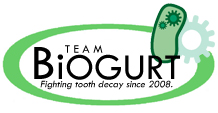Team:MIT
From 2008.igem.org
(Difference between revisions)
| Line 24: | Line 24: | ||
|- | |- | ||
| | | | ||
| - | '' | + | '' * Our goal is to engineer a common yogurt bacteria, Lactobacillus bulgaricus, so that it will express the 20aa peptide p1025. A clinical study (Kelly CG et al.; Nature Biotechnol. 1999) reports that p1025 is good for your teeth. p1025 reduces oral colonization of Streptococcus mutans, a tooth-decaying bacterium. |
| + | |||
| + | * | ||
| + | o Stage 1: Construction of p1025 fusion peptide and expression of gene in E. coli. This is an intermediate step to evaluate gene function and protein secretion/efficacy. | ||
| + | o Stage 2: Binding Assay - see if the p1025 produced by E.coli inhibits binding of S. mutants to hydroxyapatite (HA) beads. | ||
| + | o Stage 3: Expression of p1025 in Lactobacillus. | ||
| + | o Stage 4: Make yogurt with modified Lactobacillus and test for inhibition of S. mutants binding. | ||
| + | '' | ||
|[[Image:Team.png|right|frame|Your team picture]] | |[[Image:Team.png|right|frame|Your team picture]] | ||
|- | |- | ||
Revision as of 14:40, 24 June 2008
This is a template page. READ THESE INSTRUCTIONS.
You are provided with this team page template with which to start the iGEM season. You may choose to personalize it to fit your team but keep the same "look." Or you may choose to take your team wiki to a different level and design your own wiki. You can find some examples HERE.
You MUST have a team description page, a project abstract, a complete project description, and a lab notebook. PLEASE keep all of your pages within your Team:Example namespace.
| You can write a background of your team here. Give us a background of your team, the members, etc. Or tell us more about something of your choosing. | |
|
* Our goal is to engineer a common yogurt bacteria, Lactobacillus bulgaricus, so that it will express the 20aa peptide p1025. A clinical study (Kelly CG et al.; Nature Biotechnol. 1999) reports that p1025 is good for your teeth. p1025 reduces oral colonization of Streptococcus mutans, a tooth-decaying bacterium. *
o Stage 1: Construction of p1025 fusion peptide and expression of gene in E. coli. This is an intermediate step to evaluate gene function and protein secretion/efficacy.
o Stage 2: Binding Assay - see if the p1025 produced by E.coli inhibits binding of S. mutants to hydroxyapatite (HA) beads.
o Stage 3: Expression of p1025 in Lactobacillus.
o Stage 4: Make yogurt with modified Lactobacillus and test for inhibition of S. mutants binding.
| |
| Team Example 2 |
| Home | The Team | The Project | Parts Submitted to the Registry | Modeling | Notebook |
|---|
(Or you can choose different headings. But you must have a team page, a project page, and a notebook page.)
 "
"

